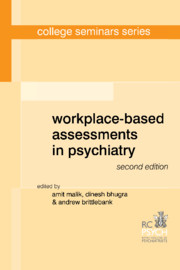Book contents
- Frontmatter
- Contents
- List of tables, boxes and figures
- List of contributors
- Preface
- 1 Introduction: changes in training
- 2 Workplace-based assessment methods: literature overview
- 3 Case-based discussion
- 4 The mini-Assessed Clinical Encounter (mini-ACE)
- 5 The Assessment of Clinical Expertise (ACE)
- 6 Multi-source feedback
- 7 Direct Observation of Non-Clinical Skills: a new tool to assess higher psychiatric trainees
- 8 Workplace-based assessments in psychotherapy
- 9 Educational supervisor's report
- 10 Portfolios
- 11 Annual Review of Competence Progression (ARCP)
- 12 Examinations in the era of competency training
- 13 Piloting workplace-based assessments in psychiatry
- 14 Developing and delivering an online assessment system: Assessments Online
- 15 A trainee perspective of workplace-based assessments
- 16 Conclusions
- Appendix 1 Assessment forms
- Appendix 2 Guide for ARCP panels in core psychiatry training
- Appendix 3 The MRCPsych examination
- Index
16 - Conclusions
Published online by Cambridge University Press: 01 January 2018
- Frontmatter
- Contents
- List of tables, boxes and figures
- List of contributors
- Preface
- 1 Introduction: changes in training
- 2 Workplace-based assessment methods: literature overview
- 3 Case-based discussion
- 4 The mini-Assessed Clinical Encounter (mini-ACE)
- 5 The Assessment of Clinical Expertise (ACE)
- 6 Multi-source feedback
- 7 Direct Observation of Non-Clinical Skills: a new tool to assess higher psychiatric trainees
- 8 Workplace-based assessments in psychotherapy
- 9 Educational supervisor's report
- 10 Portfolios
- 11 Annual Review of Competence Progression (ARCP)
- 12 Examinations in the era of competency training
- 13 Piloting workplace-based assessments in psychiatry
- 14 Developing and delivering an online assessment system: Assessments Online
- 15 A trainee perspective of workplace-based assessments
- 16 Conclusions
- Appendix 1 Assessment forms
- Appendix 2 Guide for ARCP panels in core psychiatry training
- Appendix 3 The MRCPsych examination
- Index
Summary
The clinical, scientific and regulatory milieu in which postgraduate training is delivered is constantly evolving. The pace of change in medical education is evenly matched by the pace of change in healthcare delivery and regulatory structures. This pace has been, and will continue to be, more dramatic than it was even a couple of decades ago. First, the clinical context in which training has been delivered has been transformed dramatically in the past 30 years. Significant developments in therapeutics, along with a move from asylum-based to community-based care, have helped bring about this transformation. The National Service Framework for Mental Health (Department of Health, 1999) has led to the creation of specialised teams such as the crisis resolution and home treatment teams which required trainees to be trained and assessed in a new set of skills. Many services are now considering amalgamation of these teams into more generic teams to enhance continuity of care while retaining a specialist focus. Other initiatives such as Improving Access to Psychological Therapies will pose new challenges to the skill mix within mental health teams and the demands made on a psychiatrist's competence. Although these changes in service configuration and delivery do not necessarily alter the psychiatrist–patient relationship, specific leadership, service development and management skills will be required to ensure that psychiatrists remain central to mental health delivery. The New Ways of Working initiative (Department of Health, 2005) has significantly affected the role of the consultant psychiatrist in many parts of the UK and the end product of postgraduate training must constantly be reviewed to ensure that psychiatrists are ‘fit for purpose’ for the contemporary roles. Similarly, the European Working Time Directive will continue to have major implications on the training and assessment of trainees, and the impact of this legislation should be monitored over the next decade to understand its full impact on the training, competence and confidence of future new psychiatrists. Moreover, new scientific developments such as the new pharmacological and psychological therapies or more advanced neuroradiological techniques will necessitate different clinical competencies to be acquired.
- Type
- Chapter
- Information
- Workplace-Based Assessments in Psychiatry , pp. 181 - 184Publisher: Royal College of PsychiatristsPrint publication year: 2011

